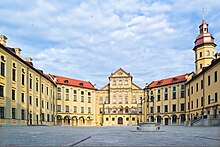Nyasvish Castle
| Architectural and cultural heritage of the Radziwiłł noble family in Nieśwież | |
|---|---|
|
UNESCO world heritage |
|

|
|
| National territory: |
|
| Type: | cultural |
| Criteria : | ii, iv, vi |
| Reference No .: | 1196 |
| UNESCO region : | Europe and North America |
| History of enrollment | |
| Enrollment: | 2005 (session 29) |

Njaswisch Castle ( Belarusian Нясвіжскі замак (Njaswischski samak), Polish Zamek w Nieświeżu , Russian Несвижский замок (Neswischski samok)) is a residential palace of the Radziwiłł family in Njazwiłł , Belarus . It is at an altitude of 183 meters. The castle was on Polish territory until the second partition of Poland in 1793 and from 1921 to 1939 and was considered to be one of the most beautiful Polish castles in the Kresy region . In 2005 the castle was by the UNESCO as a World Heritage listed.
history
After the Kiszka family died out, the property came into the possession of the Radziwiłł magnate family in 1533 when it was given to Mikołaj Radziwiłł Rudy and his brother Jan Radziwiłł . Because the Radziwiłłs were one of the most important and richest families in the Grand Duchy of Lithuania and the Kingdom of Poland , the Lithuanian archive was moved here in 1551. In 1582, Mikolaj Krzysztof "Sierotka" Radziwiłł , Marshal of Lithuania , voivode of Trakai , Vilnius and castellan of Šiauliai , began building an imposing three-storey square castle. In 1586 the property was converted into a family entailment. After the Union of Lublin , the castle became one of the most important residences in the central part of Poland-Lithuania .
In 1706, during the Great Northern War , Charles XII dismissed . his armies and destroyed the castle and fortresses. A few years later, the Radziwiłłs invited some German and Italian architects to renovate and significantly enlarge the castle. Antoni Zaleski decorated their yellow facades with baroque stucco work. The castle's 16th-century gates were also restored and the tower's two-story gatehouse was crowned with a crown. At that time, the three separate buildings surrounding the courtyard were combined into a single ensemble. In 1815 Anton Radziwiłł managed to get back the property confiscated by the Tsar.
The most important building in Nieswiez was the Corpus Christi Church (built between 1587 and 1603), which was connected to the castle by a dam. It contains 72 coffins belonging to members of the Radziwiłł family, each buried in a simple coffin made of birch and marked with the Traby coat of arms.
Individual evidence
- ↑ elevationmap.net
- ↑ Landmarks, historic and cultural, and natural sites of the Republic of Belarus on the UNESCO World Heritage List . National Statistical Committee of the Republic of Belarus. 2011. Retrieved October 12, 2013.
Web links
- Official Website of the Nyasvish Museum (English)
